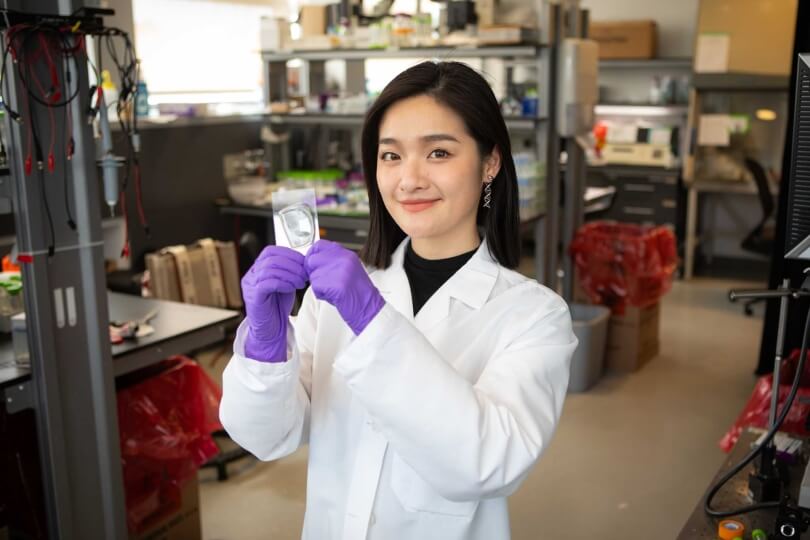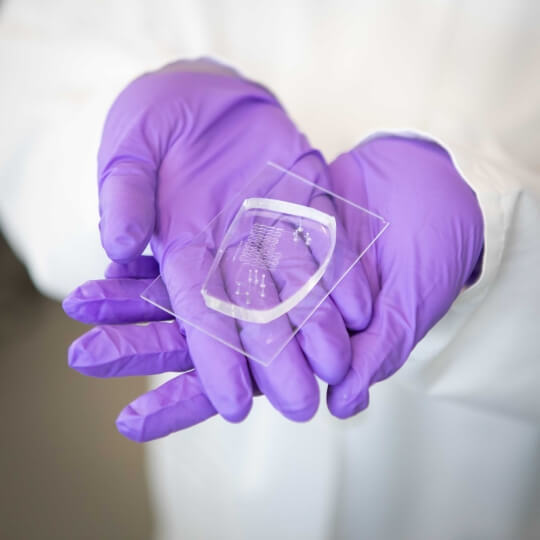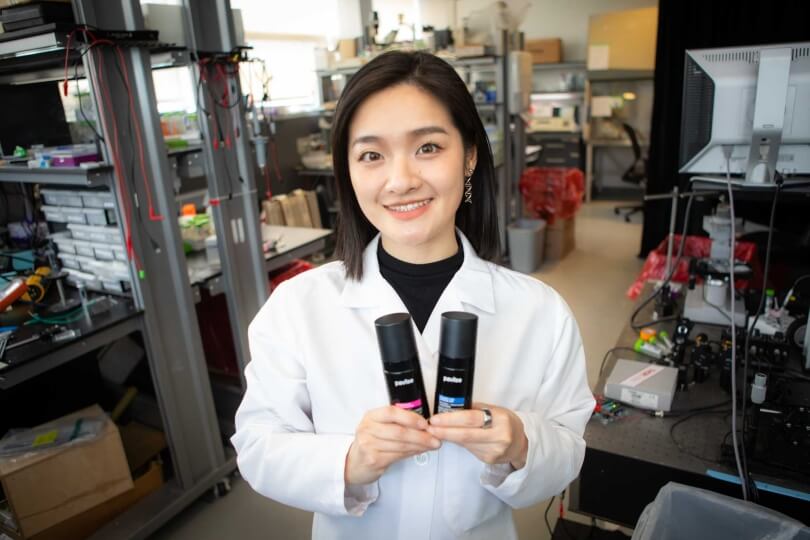Xinge Diana Zhang, Ph.D. '25, in bioengineering (Eliza Grinnell/SEAS)
Cleaning waste out of shark tanks turned Xinge Diana Zhang into a bioengineer. A high school student in Singapore at the time, Zhang joined a summer program with the marine animal rescue team at the University of Queensland in Australia.
“The program rescued wounded sharks and other marine animals and kept them in indoor tanks,” said Zhang. “But because indoor tanks don’t have good ecosystems, the sharks wind up living in their own waste, and it accumulates really fast, because they’re so big.”
To solve this challenge, Zhang and her classmates turned to enzymes that speed up chemical and biological processes. By coating a sea urchin-shaped object with the correct enzymes, Zhang was able to introduce a natural process for breaking down and removing the waste in the tanks, greatly improving the health and comfort of the sharks.
“That’s how I first learned about enzymes, how they’re a fantastic catalyst that doesn’t get consumed in the process, and are often all-natural and don’t cause harm to animals,” Zhang said. “That’s when I decided I wanted to be an engineer.”
Enzymes have been a crucial part of Zhang’s development as a Ph.D. candidate in bioengineering at the Harvard John A. Paulson School of Engineering and Applied Sciences (SEAS). After completing a bachelor’s degree in chemical engineering from the University of Southern California, she joined the Experimental Soft Condensed Matter Group run by David Weitz, Mallinckrodt Professor of Physics and of Applied Physics at SEAS. Her research centered around the use of microfluidic devices to aid in and scale up enzyme evolution, the process by which enzymes are better adapted to suit specific human needs. Zhang defended her dissertation last semester and will be hooded at Commencement at the Science and Engineering Complex.
As a bioengineering Ph.D. student in the David Weitz Lab, Xinge Diana Zhang researched the use of microfluidic devices to aid in and scale up enzyme evolution (Eliza Grinnell/SEAS)
“As an example, outside of a Japanese plastic recycling plant, scientists discovered a bacterium that actually breaks down plastic using specific enzymes,” she said. “But the process is so slow. It takes years to break them down. If we can take that enzyme, mutate it so that it breaks down the plastic much faster, that could be used by humans to break down plastic in a very natural way.”
A summer internship at a Chinese venture capital fund convinced Zhang to pursue a graduate degree. She’d already done internships at both a company that manufactures interlayers for laminated safety glass and a major biopharma company’s insulin plant, but neither experience felt like long-term career directions. Working at the VC fund, Zhang got her first taste of entrepreneurship, and began to see how something in the lab could be commercialized and applied in the real world. The internship also reinforced the importance of academic expertise and accreditation.
“All the investment managers there had higher degrees, like MDs or PhDs,” she said. “I’d done undergraduate research throughout my time at USC, so I thought getting a graduate degree might be a good path for me.”
Weitz’s background as both an applied scientist and an entrepreneur sold Zhang on the SEAS Ph.D. program. In November 2022, she co-founded Enzymor, a start-up offering enzyme-enriching soil products for the agricultural sector. The company was founded as part of a competition run by Nucleate, a global non-profit for young bio-innovators.
“It was a really good taste of the start-up world, and it taught me skills such as developing a business plan, finance, and selling your science,” she said. “We did intensive research, talked to farmers, and realized it was a very difficult sector to penetrate. We believe that using an enzymatic fertilizer would be beneficial for the food we eat, and the environment in general, but it was hard to sell it. Enzymor really made me think about what I could apply my technology to, who I’m selling to, and in which sector I should choose to do my business.”
Many of Zhang’s biggest life changes might not have happened had she not come to SEAS. She met her future husband at a graduate student event – and they now have a baby together. She also joined Prof. David Weitz’s lab, where she found a mentor not just in science, but in life.
Having already defended her Ph.D. dissertation, Xinge Diana Zhang now works as Head of Engineering for Beyond Active Ingredient Biosciences in Cambridge (Eliza Grinnell/SEAS)
“Dave has been a mentor for both my research and my personal growth,” she said. “He gave me so much good advice and was incredibly supportive of my entrepreneurial journey. Harvard gathers the best people from all over the world. That resource is unparalleled. The people I’ve met here, the things we’ve been through, the conversations we’ve had and the friends we’ve made will last with me for my entire life.”
Zhang also met her future boss, Sophie Bai, through Harvard. Trapped in her apartment complex like much of the world in the first year of the COVID-19 pandemic, Zhang became close friends with her neighbor, Bai. Bai had just completed her MBA at Harvard Business School, and had founded a skin healthcare company, Beyond Active Ingredient (B.A.I.) Biosciences, in Cambridge, with the support of the Harvard Blavatnik Fellowship in Life Science Entrepreneurship program. Done with her studies at SEAS, Zhang joined B.A.I. as its Head of Bioengineering in February. The biotech company produces products to treat or help prevent conditions such as atopic dermatitis or skin cancer, as well cosmetic challenges such as skin aging.
“The work I’m doing now is very similar to my enzyme evolution work,” Zhang said. “One in five Americans get skin cancer by the age of 70. Everyone is a patient facing skin concerns and diseases. There is so much good science that needs to be done. I love the feeling knowing that my work at the lab is directly translating into technologies and products that can improve people’s lives. This is why I became a scientist in the very first place.”
Press Contact
Matt Goisman | mgoisman@g.harvard.edu


